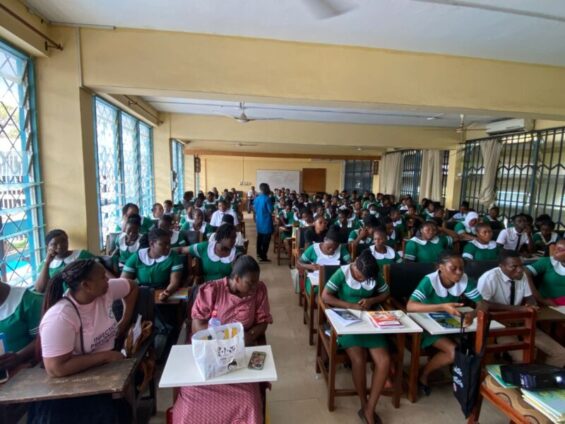To address the growing threat of health misinformation and disinformation, a targeted training workshop and outreach has been successfully conducted for community health workers and health trainees in Accra.
The face-to-face training aimed to equip participants with practical tools and knowledge to identify, verify, and combat health misinformation in their respective communities.
Participants included community health workers who serve on the frontlines of public health delivery, NGOs and health trainees who represent the next generation of healthcare professionals.
The training focused on differentiating between misinformation (unintentional spread of false information) and disinformation (deliberate spread of falsehoods), hands-on exercises in using fact-checking tools and techniques to verify health-related information and strategies for community engagement to correct health misinformation and ensure that accurate health information is communicated at the grassroots level.
Participants were given access to fact-checking tools, digital resources, and guidance on navigating the rapidly evolving digital landscape, where misinformation often spreads the fastest. Health misinformation and disinformation pose significant challenges to public health in Ghana, especially in under-served areas.

Misinformation around vaccines, health treatments, and common medical conditions can lead to severe public health consequences, including vaccine hesitancy, misdiagnosis, and dangerous home remedies that could have otherwise been avoided with accurate information.
During the COVID-19 pandemic, Ghana experienced a surge in health-related misinformation, which contributed to widespread confusion about the virus and vaccines.
This workshop directly addresses these concerns by empowering those who work closest to the public to become fact-checkers and trusted sources of information within their communities.
Kelvin Odonkor, who is the lead facilitator of the workshop, emphasized, "Health misinformation is one of the biggest public health threats we face today. It undermines trust in health systems, endangers lives, and spreads fear. Through this project, we’ve given some health workers and young health professionals awareness about the problem and the tools they need to identify and combat these falsehoods and protect their communities. We are also building a network of independent health fact checkers to support in the fight against health misinformation/disinformation in Ghana".

Impact and Key Outcomes
By the conclusion of the workshop:
- Participants were able to distinguish between misinformation and disinformation.
- Participants were able to acknowledge the dangers of misinformation/disinformation on public health
- They learned how to use fact-checking tools to verify information and debunk myths related to health.
- A network of health misinformation fact-checkers and ambassadors was formed, with a shared goal of combating health falsehoods and promoting accurate health information in Ghana.
Feedback from the Workshop.
One participant, a public health nurse, shared her thoughts, "This workshop has enabled us to understand the difference between misinformation and disinformation. It has equipped me with the tools to ensure that the information I share or use is accurate.”
The Programmes Officer at the Public Health Nursing School expressed her excitement about the engagement and advocated that more students including tutors benefit from the training.
Rabbi Braimah, a public health nurse and participant recommended that the training should not be limited to only the targeted audience but should be extended to religious groups and community leaders.

Looking Forward
The second part of the face-to-face training workshop is expected to take place in the Northern region.
The project is expected to build on its success to expand the training and outreaches to a more targeted audience and in all regions across Ghana, building a larger network of trained health workers and trainees who can act as "health misinformation ambassadors" working closely with NGO’s, and influencers in their communities.
These ambassadors will be instrumental in preventing the spread of false health information and fostering a more informed public.
This initiative is spearheaded by Kelvin Odonkor, an International Visitor Leadership Program (IVLP) Impact Award recipient in partnership with the Christian Health Association of Ghana, Korle Bu Teaching Hospital, Public Health Nursing School, Korle Bu, FactCheck Ghana, and DUBAWA.
This project was made possible through funding by the U.S. Department of State’s Bureau of Educational and Cultural Affairs, with Meridian International Center as the implementing partner.
About the IVLP Impact Awards
The International Visitor Leadership Program (IVLP) Impact Awards provide alumni of the IVLP with the opportunity to receive grants to implement community service projects based on the skills and knowledge they acquired during their IVLP exchange.
These projects address critical global issues such as health, the environment, education, and civic engagement.
Latest Stories
-
WAFCON 2024: Black Queens must be at their best against Mali – Kim Björkegren
34 minutes -
Ablekuma North: Someday others will fly because you walked – Akosua Manu to Akua Afriyie amid EC rerun decision
58 minutes -
Hungary, Switzerland and India explore mining partnership with Lands Ministry
1 hour -
Akufo-Addo/Bawumia government’s major gains in TVET transformation highlighted
1 hour -
IERPP to ORAL: Where’s the $18.4bn recovery account?
1 hour -
‘IMF is not God’ – Amanda Clinton
2 hours -
GIPC launches Investment Opportunities Mapping Project
2 hours -
TVET no longer the preserve of the less academically inclined – Education Minister
2 hours -
Ablekuma North rerun: Security plans to follow
2 hours -
Ablekuma North rerun: EC defends use of scanned pink sheets
3 hours -
EC confirms security assurance ahead of Ablekuma North rerun
3 hours -
No arrests made over 2024 Ablekuma North election violence – EC
3 hours -
Ablekuma North rerun: Photos from the constituency ahead of Friday polls
3 hours -
TECNO kicks off new era with Spark 40 series and CAF partnership
3 hours -
Ablekuma North re-run: Bawumia supports Akua Afriyie with GH₵410k
3 hours

